Trump administration says the U.S. companies want more access to China’s economy. They wanted to rebalance what they say is an unfair trading relationship. During talks between the world’s two largest economies, U.S. Commerce Secretary Wilbur Ross said China’s US$347 billion trade deficit with the United States was not the product of market forces.
“We must create more balance in our trade by increasing exports of made-in-America goods to China. There are significant opportunities to do this if we can work together to remove the significant barriers that continue to exist.” – Ross said at the Treasury Department. However, as predicted, the Chinese officials disagreed and practically told the Yankee to go fly kite.
So on Wednesday, the U.S. and China failed to agree on major new steps to reduce the U.S. trade deficit with China. It was so screwed up that the annual economic dialogue session in Washington ended with cancelled news conferences, no joint statement and no new announcements on U.S. market access to China. It has failed spectacularly.
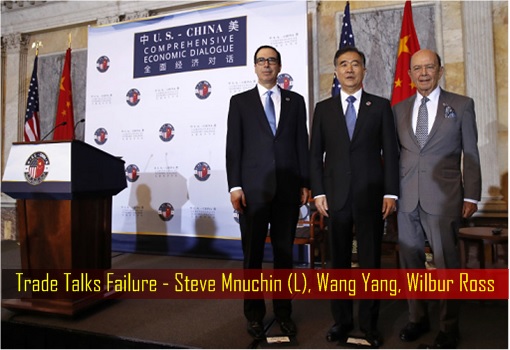
Essentially, the failure delivers a slap on President Donald Trump’s face as he had expected some form of success on his “U.S.-China Comprehensive Economic Dialogue” talks. Trump who prides himself as being the ultimate deal maker appears to have bumped into a greater deal maker – China – as the Chinese refuse to budge so that the U.S. could win with ease.
The two nations had a “frank exchange” but failed to agree on most major bilateral trade and economic issues that were important to the United States. Trump had hoped that after his first meeting with Chinese President Xi Jinping at his Mar-A-Lago, Florida, estate earlier in April, the Chinese could be persuaded to open its market to the Americans.
It was revealed that Trump’s team has presented a tall demand, included demands for access to China’s financial services markets, reducing excess Chinese steel capacity, reductions in auto tariffs, cutting subsidies for state-owned enterprises, ending Chinese requirements for data localization and lifting ownership caps for foreign firms in China.
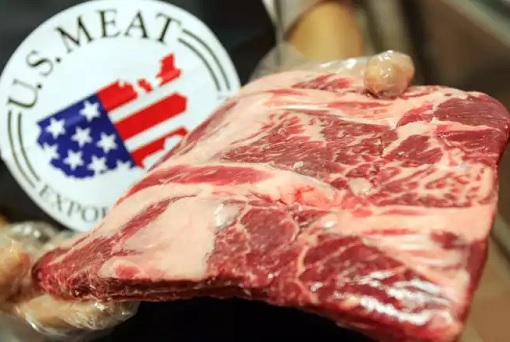
The Chinese, however, drove a hard bargain when it had only granted some minor victories to Donald Trump, which included the resumption of American beef sales in China – after 14 years hiatus – and pledged to grant limited U.S. access to some financial services sectors, such as card payment services. They also to buy U.S. liquefied natural gas.
Mixing business with politics also saw Trump threatening new sanctions on small Chinese banks and other firms doing business with Pyongyang after he got frustrated with China’s lack of pressure on North Korea. After the meltdown in trade talks between both parties, Trump was asked by a reporter at the White House whether he would impose steel tariffs, to which he said – “Could happen.”
Trump administration has blamed massive Chinese excess capacity for a global steel glut that is hurting U.S. producers. But China has taken the opportunity to cry, whine and bitch about the same thing – that Washington has refused to sell Beijing advanced technology products. Therefore, the Chinese argued that the Yankees have to give them something in return, not threats.
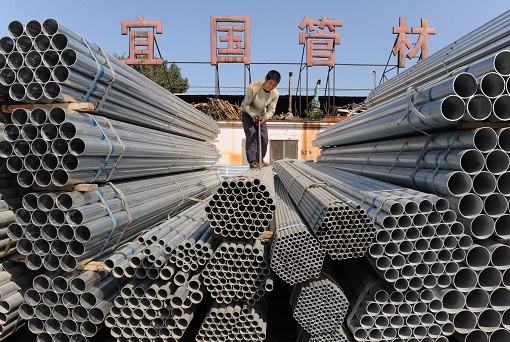
The trade talks were also attended by Jared Kushner, President Donald Trump’s son-in-law and a senior White House adviser. Chinese Vice Premier Wang Yang said the two sides should maintain a healthy dialog and warned against starting down the path of confrontation over trade – “Dialog cannot immediately address all differences, but confrontation will immediately damage the interests of both.”
Investors interpreted the negative signals from the talks and lack of new trade announcements as making it more likely that Trump would forge ahead with broad steel tariffs or quotas. If Trump does that, either the China would be cowered or retaliated with its version of trade war. The burning question is: could Trump take more heat than he’s already facing now?
His plate is full of failures and scandals. The infamous Trump-Russia investigation is alive and kicking and even gaining steam, thanks to Trump’s idiot son. The infighting among Republicans saw Trump’s pledge to repeal and replace the Obamacare flops fantastically. Even Trump’s military threat against badass Kim Jong-un was met with more missile tests instead.
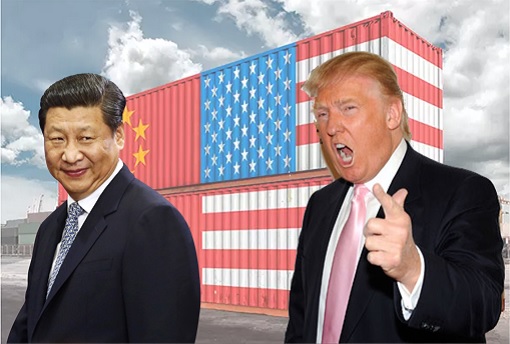
At this hour, could Trump really afford to launch a full-scale trade war with China? It would be a great diversion tactic to his domestic issues only if he is certain he could win the war. To be fair, Trump’s boys have picked the wrong timing to pressure China to open their markets, not that the Chinese would submit to the U.S. to begin with.
With the 19th Communist Party Congress around the corner, President Xi Jinping would be mad to meet Trump’s demands. If more American companies are allowed into the Chinese market through liberalization, it would be taken as a sign of an invasion of the Yankees – what more with the Americans wanting control on what they can and cannot do on Chinese soil.
If Trump still thinks that talking tough to China will produce positive results, clearly he doesn’t know the Chinese very well. From Beijing’s perspective, international trade takes a second seat to internal politics. President Xi Jinping’s top priority is to maintain political stability. He cannot lose face in his relations with President Trump and hope to retain power at home.

More importantly, Xi cannot deal with an American president who the Chinese feel fails to show proper respect for China itself, not after Trump sent some destroyer warships to South China Sea just to show off their military prowess. A trade war would not be a disaster for China, mainly because the U.S. needs China more than vice versa. The situation might have been different 20 years ago.
Even if companies like Apple agrees that America goes for a trade war with China, would American consumers agree to pay more for U.S.-made goods? Sure, on the surface they say they love U.S.-made products. But a research says otherwise. A latest Reuters/Ipsos poll found 70% of Americans think it is “very important” or “somewhat important” to buy U.S.-made products.
However, 37% said they would refuse to pay more for U.S.-made goods versus imports. About 26% said they would only pay up to 5% more to buy American, and 21% capped the premium at 10%. Hence, Trump’s promises of bringing back manufacturing jobs and boosting economic growth could backfire spectacularly.
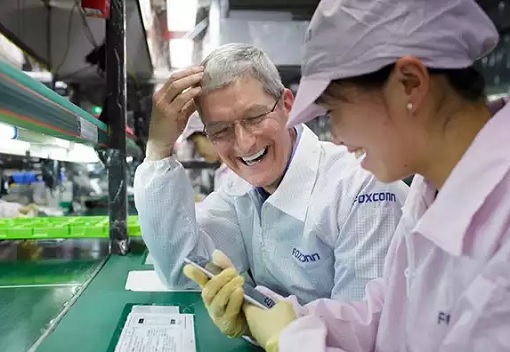
Other Articles That May Interest You …
- China Bans Winnie The Pooh – Here’s Why The Teddy Bear Is Blacklisted
- China’s New Cybersecurity Law Effective Today – What Does It Mean To You
- China Invasion – Top 10 American Iconic Brands Now Owned By Chinese
- Declaration Of War! – U.S. Military Wants Control Over Ports In China & Russia
- How China Brilliantly Uses North Korea To Get What They Want From Trump
- Killing The US Dollar – China And Russia Getting Out Of Greenbacks Control
- Relax Mr. Kim, Here’s Why China Will Not Allow U.S. Attacks North Korea
- Here’s How China Hurts U.S. – Boycotts All South Korean Products
- China Is Terrified – Trump Has The Power & Ability To Screw Its Economy

|
|
July 20th, 2017 by financetwitter
|


|

|

|

|

|

|




























Comments
Add your comment now.
Leave a Reply